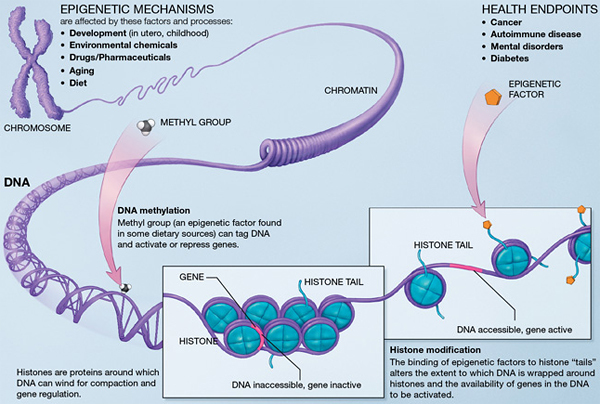On this page...

Mukesh Verma, PhD
Branch Chief, Methods and Technologies Branch
vermam@mail.nih.gov
Overview
Epigenetics focuses on processes that regulate how and when certain genes are turned on and turned off, while epigenomics pertains to analysis of epigenetic changes across many genes in a cell or entire organism.
Epigenetic processes control normal growth and development and this process is deregulated in diseases such as cancer. Diet and exposure to environmental chemicals throughout all stages of human development among other factors can cause epigenetic changes that may turn on or turn off certain genes. Changes in genes that would normally protect against a disease, as a result, could make people more susceptible to developing that disease later in life. Researchers also believe some epigenetic changes can be passed on from generation to generation.
The epigenome can mark DNA in two ways, both of which play a role in turning genes off or on. The first occurs when certain chemical tags called methyl groups attach to the backbone of a DNA molecule. The second occurs when a variety of chemical tags attach to the tails of histones, which are spool-like proteins that package DNA neatly into chromosomes. This action affects how tightly DNA is wound around the histones.
Epigenetic mechanisms are affected by several factors and processes including development in utero and in childhood, environmental chemicals, drugs and pharmaceuticals, aging, and diet.

Figure 1: Epigenetic mechanisms are affected by several factors and processes including development in utero and in childhood, environmental chemicals, drugs and pharmaceuticals, aging, and diet. DNA methylation is what occurs when methyl groups, an epigenetic factor found in some dietary sources, can tag DNA and activate or repress genes. Histones are proteins around which DNA can wind for compaction and gene regulation. Histone modification occurs when the binding of epigenetic factors to histone tails; alters the extent to which DNA is wrapped around histones and the availability of genes in the DNA to be activated. All of these factors and processes can have an effect on people's health and influence their health possibly resulting in cancer, autoimmune disease, mental disorders, or diabetes among other illnesses. Image provided courtesy of NIH Common Fund.
Funding Opportunities
EGRP encourages investigator-initiated grant applications on these topics.
View other EGRP, NCI, and NIH funding opportunities
Public Resources
- Epigenomics Fact Sheet
This fact sheet from the National Human Genome Research Institute (NHGRI) explains what the epigenome is and what it does, discusses what the epigenome consists of and whether the epigenome is inherited. It also reviews imprinting, what can cause the epigenome to change, and how these changes contribute to cancer risk.
Research Resources
NIH Resources
- NIH Common Fund Epigenomics Program
This site contains links to epigenomics mapping resources, epigenomics and epigenetics funding opportunities, meeting information, and more. - NIH Epigenetics Interest Group
The focus of the Epigenetics Interest Group is on applications of epigenetic approaches in disease detection, risk assessment and treatment.
Other Resources
- EpiGeneSys

The “EpiGeneSys” Network aims to bridge epigenetics and systems biology. Resources on this website include research protocols, events, and more. - Epigenie

Provides the latest epigenetics research headlines, methods, new products, and interviews with researchers in the field. - International Human Epigenome Consortium

IHEC is a global consortium whose goal is to provide free access to high-resolution reference human epigenome maps for normal and disease cell types to the research community. It is also a source of information about international epigenomics activities.